Some need years of training to become a conductor, others are naturals.

Music
Music has the capacity to inspire, engage and enrich students. It also helps to develop learning in other areas of the curriculum. At Winthrop music forms a large part of the school’s identity. Every student from Pre-Primary to Year 6 participates in class music lessons and from Year 3 onwards there are opportunities for instrumental lessons. In addition many musical activities take place throughout the year.
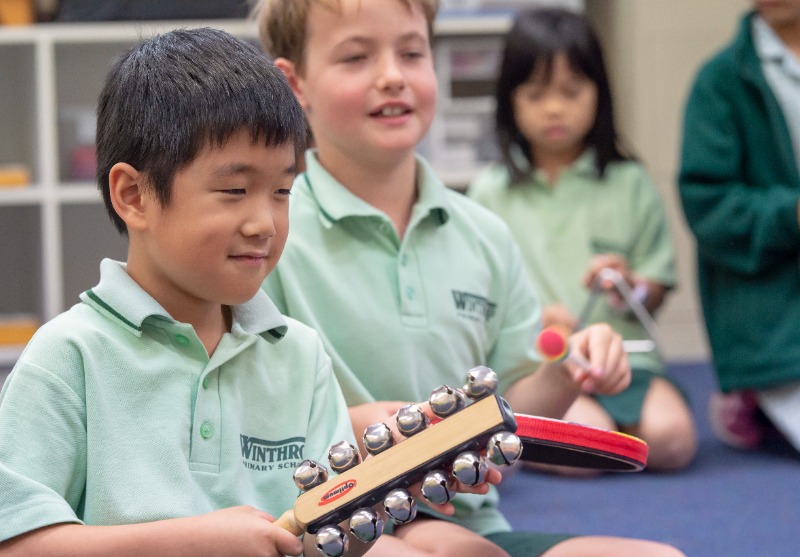
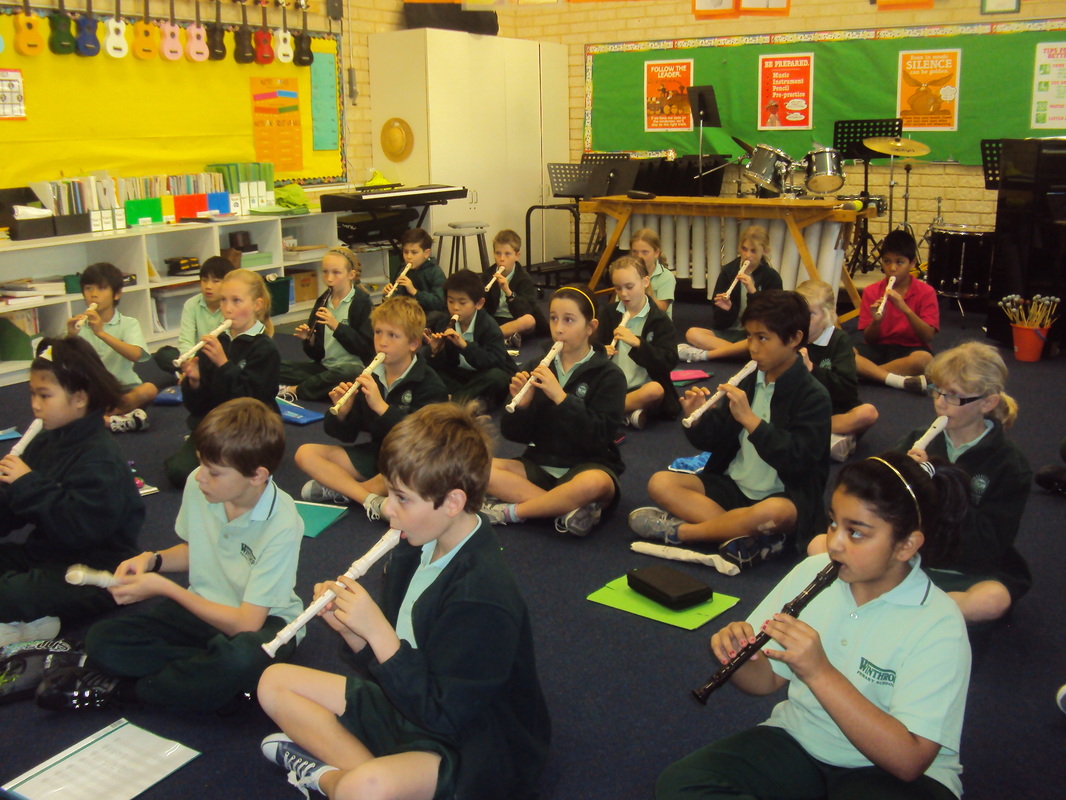
Class Music
Children from Pre-Primary to Year 6 have a music session with the specialist music teacher once a week. In class music sessions children learn the skills of music through singing, rhythm activities, movement and playing instruments. They create their own arts works. They listen and respond to the performances of others and learn to appreciate the role of music in our society.
In the early years, musical concepts are reinforced by playing percussion instruments. In Year 4, the children learn recorder. In Year 5 they learn some basic ukulele.
Music Timetable
| Tuesdays | 7:45 - 8:35am | String Ensemble |
| Wednesdays | 7:45 - 8:35am | Choir |
| Thursdays | 7:45 - 8:35am | Year 5 Band |
| Thursdays | 7:45 - 8:35am | Year 6 Band |
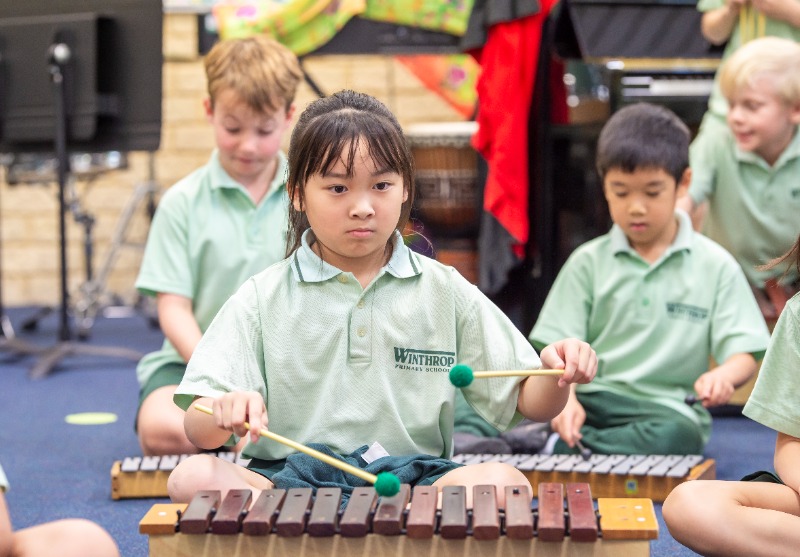
“We teach music because it is unique and good. We teach music so that children can make their own music. We teach music because it acts in a unique way on the heart, mind, soul and spirit of the child, stimulating thought and imagination in very special ways.”
Richard Gill
Read More about our Music Programs
Instrumental Music School Services (IMSS)
A service offered by the Department of Education.
Peripatetic teachers visit the school and provide a 30 minute lesson once per week. Students who have attained a good standard of playing also participate in a string ensemble.
Lessons are free to selected students, who are expected to remain with the program throughout primary school and ideally into high school. Instruments offered are:
- Violin or Viola – starts in Year 3 (8 students)
- Cello – starts in Year 4 (3 students)
- Guitar – starts in Year 5 (5 students)
- Double Bass – starts in Year 5 (2 students)
Selection is based on the following criteria
• Willingness to participate
• Enthusiasm and aptitude for music as demonstrated in the class music program and in standardised testing
• Adequate parent support
• Appropriate physical characteristics
• Ability to meet the requirements of the program
Band Program
- The Band Program commences in Year 5 and is open to any interested student.
- No previous instrumental experience is required.
- Instruments offered are flute, clarinet, saxophone, trumpet, trombone and percussion
Students have a 30 minute lesson, in small groups, once per week and attend a full band rehearsal once a week. It is expected that children will remain in the band program until they leave the school. Lessons are held in school time with private tutors who currently charge approximately $120 per term. Band sessions are out of school hours (see below). There is also an additional band fee of approximately $100 per annum. Parents need to provide an instrument.
Current band rehearsal times:
Year 5 Thursday 3.00 – 4.00pm
Year 6 Thursday 7.45 – 8.45am
Choir
Children from Years 4-6 are welcome to apply for membership of the School Choir. Enthusiasm and a willingness to improve are the main criteria. Members are expected to attend rehearsals regularly and punctually.
In term One the focus is on Anzac Day and the choir performs at the school’s Anzac Service at the end of term. In terms two and three we prepare for a major festival, generally the Massed Choir Festival, held in the Perth Concert Hall at the end of term three. For this performance we wear formal uniform (black pants, white shirt, black shoes and socks. The school provides a green waistcoat).
Instrumental Music Policy
Rationale
The school recognises the social and learning benefits that flow from studying a musical instrument and facilitates these by supporting the Department of Education and Training’s School of Instrumental Music (SIM) program and the School Band Program. It is intended that participation in one of these programs will supplement and complement the class music lessons provided for every child in Years 1-6.
Aims
- To provide equal access to develop skills, knowledge and understanding through instrumental tuition.
- To encourage the development of enthusiasm, confidence, satisfaction and technical ability through practical involvement.
Instrumental Programs
String Program
The String Program is provided by the School of Instrumental Music (SIM), in conjunction with the school. Selected children receive a 30-minute group lesson once per week. Lessons are held in school time by peripatetic teachers who visit the school. Lessons are free, though parents need to provide an instrument. To be accepted into an instrumental music program, students must satisfy the following criteria:
- Willingness to participate in the instrumental music program
- Enthusiasm and aptitude for music as demonstrated through participation in the classroom music program and standardised aptitude testing
- Adequate parental support
- Appropriate physical characteristics.
- Ability to meet the requirements of the program (students have to come out of other classes for their instrumental lesson and must be prepared to do a minimum of 30 minutes daily practice).
No previous musical experience is necessary.
The year levels involved in the string program are:
- Year 3 – violin (8 children)
- Year 4 – ‘cello (3 children)
- Year 6 – guitar (5 – 10 children)
Once selected, children are expected to remain with the program throughout primary school. If attending a government high school lessons can be continued there. When an appropriate standard of performance is reached, SIM provides ensemble opportunities, in which the students are expected to participate. Currently the orchestral strings have a weekly ensemble which runs for an hour (Tuesday 2:30-3:30pm). The guitar students receive occasional ensemble opportunities. Entry to all ensembles is at the discretion of the instrumental teacher.
The selection process begins in term 4 of the year prior to lessons commencing and is finalised the following term after parent information evenings held by SIM.
Further information about the SIM program can be found at www.sim.iinet.net.au
Band Program
The Band Program is coordinated by the P & C and is administered by a parent committee, who arrange for tutors for the various instruments and the appointment of a band conductor. Children receive a 30-minute group lesson once per week, which may or may not be in school time. They also attend a one hour band rehearsal once per week.
There are no set criteria for entry, though there is an expectation that children will remain in the program until the end of Year 6 and that children will practise their instruments regularly. If students are participating in the SIM String program it is at the discretion of the class teacher, music specialist and Principal to consent to the student participating in the string <em “mso-bidi-font-style:=””>and band programs. There is an expectation that that the SIM string students will continue with this program until the end of year 7.
Parents pay a fee (currently $120 per term) for lessons and an additional band fee (currently $100 per annum). Parents must provide an instrument.
No previous musical experience is necessary.
Instruments offered are: flute, clarinet, saxophone, trumpet, trombone and percussion. Children commence tuition in Year 5. The band rehearsals are currently held at the following times:
- Year 5 Thursday 3:00-4:00pm
- Year 6 Thursday 7.45-8.45am
Parents of Year 4 children receive information about the band program in term 4 and are invited to a parent information meeting at the school later that term. Children may then attend a demonstration session where they can meet the tutors and find out more about the instruments offered.
Parents provide active support of the Band Program through the Band Committee, a sub-committee of the P and C. The Band Committee coordinate uniforms, produce regular newsletters and assist with copying of band music and excursions. Parents of children in the Band Program are encouraged to join the committee.
Participation
The school encourages participation in one of the instrumental programs.
Entry into and continued participation in the instrumental programs offered is at the discretion of School Principal.
Special Events
Sports Day Samba
Our school sports day is famed for the march past led by a colourful Samba Band, made up of senior students.
Music Count Us In
Each year we participate in Music Count Us In, where schools around Australia sing together at the same time on the same day to acknowledge the importance of music education.
At Winthrop we usually form a rock band to lead the singing.
Musica Viva
Professional musicians visit the school as part of the Musica Viva program. This gives our children the opportunity to learn about music from a variety of genres and cultures.
Orchestra Excursion
We often take classes of children to the Perth Concert Hall to see our fabulous West Australian Symphony Orchestra. They experience classical music in a world class venue.
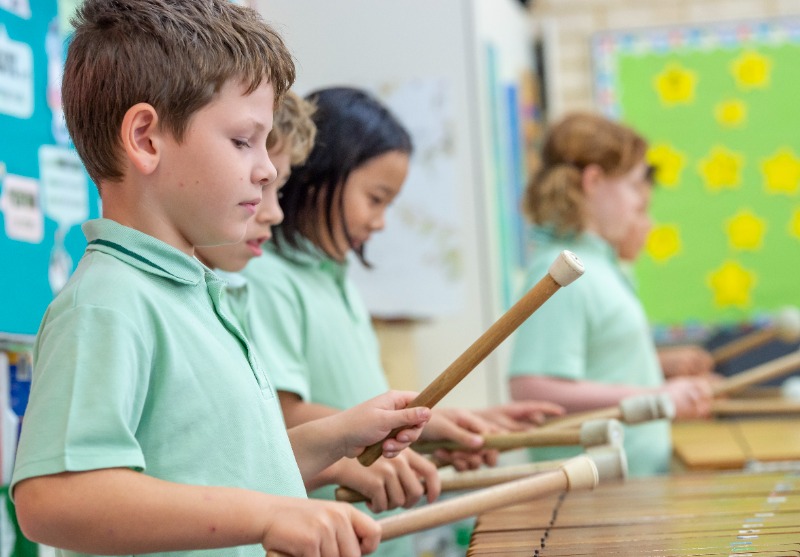
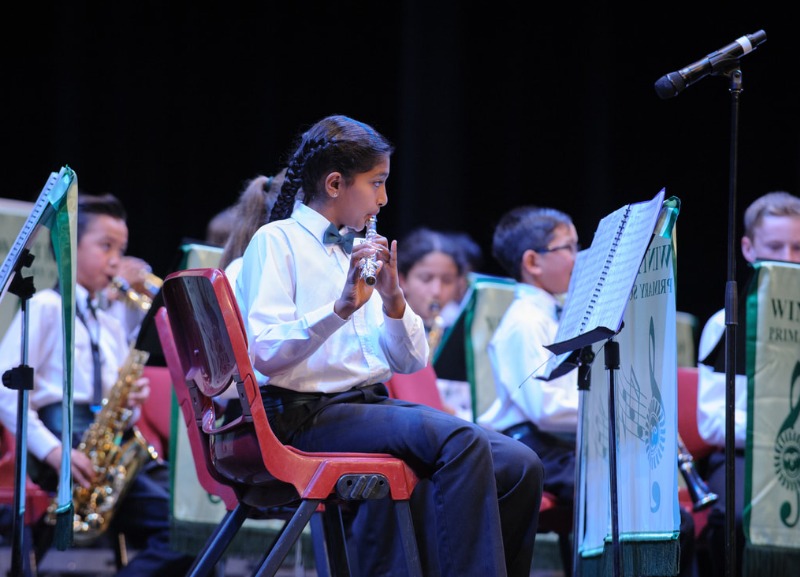
Music Links
Reconciliation Service Year 6
Click on the songs to hear a recording and to download the lyrics.
Aboriginal Soldiers (recording)
Aboriginal Soldiers (lyrics)
Year 5 Ukulele
Useful Websites
Practice naming notes
Direct your own opera
For Parents
How do your get your child to practice? Anita Collins has some tips here
Australian research has identified the value of participating in arts experiences in school.
Why Do Music?
Click here to read some excellent research on the benefits of music education and why it is so important in our schools
Neilson Survey – Music is Top Entertainment Choice
In their annual US music survey Neilson has found 93 percent of Americans regularly listen to music. Key findings are:
- 75 percent actively listen to music, higher than television at 73 percent
- Listening in the car was the most popular at 25 percent
- Listening at work or at home doing chores follow, each with around 15 percent
- Radio is the favoured platform, used by 59 percent of listeners
- Personal libraries account for 48 percent of listening, followed by on demand streaming services at 41 percent
Just for Fun...
Learn and Grow Together.



